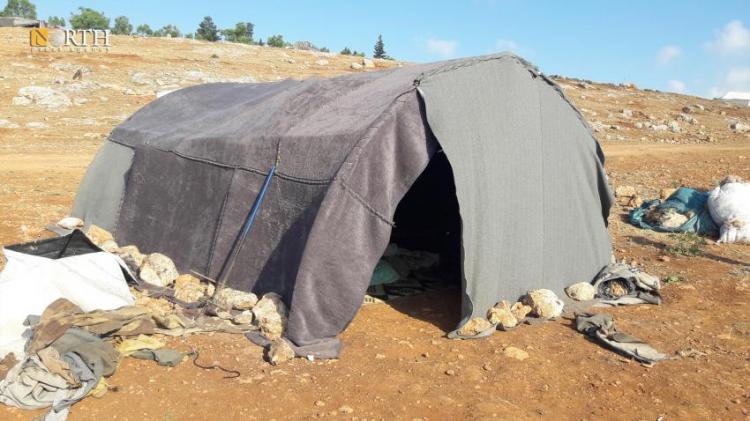Idlib – North-Press Agency
Residents of the Sheikh Bahr camps in the northern countryside of Idlib face difficulties and challenges, the most prominent of which is their marginalization by relief organizations that have not provided them with any aid for nearly five months. This has increased their suffering, as families are forced to manage their affairs through crushing debts, according to sources from those camps.
The number of Sheikh Bahr camps is 17, and each camp houses more than 100 families who have been displaced from several areas in the Idlib countryside. They have settled in a camp that lacks the most basic essential elements of life, according to the director of one of the camps located in the region.
Bitterness of life
Al-Salam camp is one of those camps whose residents suffer from bitterness in life amid their need for everything, from food and water to medicine and education.
Khalid Ali Suwaidan, the director of the Al Salam camp, told North-Press that "the camp consists of 95 tents sheltering 120 families who have been displaced for nearly five months from the eastern countryside of Ma`rat al-Numan."
Suwaidan pointed to the deteriorating conditions of the camp’s residents amid difficult living conditions, high prices, and high cost of living, as the camp residents need bread and financial aid in addition to tents, food baskets, bathrooms, and a school. They also require the covering of tent floors with a layer of broken stone to isolate them from the sun's heat.”
Suwaidan talked about the deteriorating health situation in the camp, saying that “when we ask for help we don’t get any response; there are about 15 cases of chronic disease in addition to the presence of a large number of disabled people.”
Suwaidan complained about the absence of relief organizations and their support of the camp’s residents, saying, "Since our displacement from the beginning of 2020, we have not received any help from supporting organizations, and we challenge any organization to say that it distributed us humanitarian or medical aid, or even hygiene baskets."
No support
The situation is not different for al-Wafa camp residents, which is also similar to the Sheikh Bahr camps in terms of poor living conditions due to the absence of relief support.
Abu Hammam al-Idlabi, the director of al-Wafa camp, told North-Press that “the people are suffering from bad living situations amid the absence of relief support and high prices; in addition to that the daily family expense is on average 7,000 Syrian pounds, which varies from family to family according to its size.”
Regarding how families manage daily expenses amid poor economic and living conditions, al-Idlabi explained that "the majority of camp residents are forced to borrow money in order to facilitate their daily affairs."
There are a number of cases of chronic disease in the camp, and with the absence of a health center, they are forced to travel a long distance of 13km to reach the nearest hospital to receive treatment, according to al-Idlabi.
The al-Wafa camp houses 140 displaced families from the rural areas of Ma`rat al-Numan and Zawiya Mountain in the southern countryside of Idlib. Aid was also absent for several months, according to the camp director.
On May 22, a severe storm struck the Sheikh Bahr camps in Idlib, northern Syria, causing damage to dozens of tents, without any injuries among the displaced people.
Commenting on this, the director of the Response Coordinators Team Eng. Mohammed Hallaj, told North-Press that “as usual, the problems of the camps in northern Syria never end, whether by rainstorms, fire, or poisoning cases. Today a new tragedy has been added, which is windstorms, and most of the camps of Sheikh Bahr have been affected by the strong winds that struck the area.”

